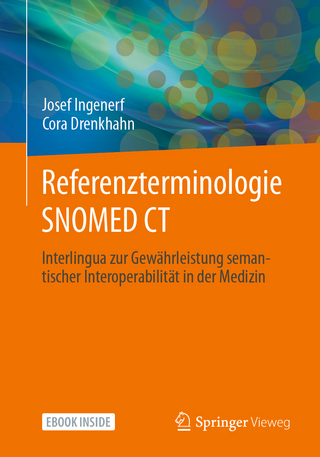
Homomorphic Signature Schemes
Springer International Publishing (Verlag)
978-3-319-32114-1 (ISBN)
'1 From Digital to Homomorphic Signature Schemes 1.1 Digital Signatures 1.2 Digital Signature Schemes Security Definition 1.2.1 Known-Message Attack 1.2.2 Chosen-Message Attack 1.2.3 Adaptive Chosen-Message Attack 1.3 Homomorphic Signature Schemes 1.4 Homomorphic Signature Schemes Security Definition 2 Homomorphic Signature Schemes 2.1 Homomorphic Signature Schemes for the Single-User Scenario 2.1.1 Linearly Homomorphic Signature Schemes 2.1.2 Homomorphic Signature Schemes for Polynomial Functions 2.1.3 Fully Homomorphic Signatures 2.2 Homomorphic Signature Schemes for the Multi-Users Scenario 2.2.1 Multiple Sources Homomorphic Signature Schemes 2.2.2 Homomorphic Aggregate Signature Schemes 3 Evaluation of Homomorphic Signature Schemes 3.1 Hardness Assumptions 3.1.1 Bilinear Groups 3.1.2 RSA 3.1.3 Lattices 3.2 Efficiency and Size 3.3 Security 3.3.1 Weak Adversary 3.3.2 Strong Adversary 3.4 Privacy 3.5 Random Oracle Model vs. Standard Model
4 State of the Art of Homomorphic Signature Schemes 4.1 Linearly Homomorphic Signature Schemes Defined Over Bilinear Groups 4.1.1 Signing a Linear Subspace: Signature Schemes for Network Coding, by Boneh et al. (2009) 4.1.2 Homomorphic Network Coding Signatures in the Standard Model, by Attrapadung and Libert (2011) 4.1.3 Computing on Authenticated Data: New Privacy Definitions and Constructions, by Attrapadung et al. (2012) 4.1.4 Efficient Network Coding Signatures in the Standard Model, by Catalano et al. (2012) 4.1.5 Improved Security for Linearly Homomorphic Signatures: A Generic Framework, by Freeman (2012) <4.1.6 Efficient Completely Context-Hiding Quotable and Linearly Homomorphic Signatures, by Attrapadung et al. (2013) 4.1.7 Secure Network Coding Against Intra/Inter-Generation Pollution Attacks, by Guangjun et al. (2013) 4.1.8 Summary of Linearly Homomorphic Signature Schemes Defined Over Bilinear Groups 4.2 RSA-Based Linearly Homomorphic Signature Schemes 4.2.1 Secure Network Coding Over the Integers, by Gennaro et al. (2010) 4.2.2 Adaptive Pseudo-Free Groups and Applications, by Catalano et al. (2011) 4.2.3 Efficient Network Coding Signatures in the Standard Model, by Catalano et al. (2012) 4.2.4 Improved Security for Linearly Homomorphic Signatures: A Generic Framework, by Freeman (2012) 4.2.5 Summary of RSA-Based Linearly Homomorphic Signature Schemes 4.3 Lattice-Based Linearly Homomorphic Signature Schemes 4.3.1 Linearly Homomorphic Signatures over Binary Fields and New Tools for Lattice-Based Signatures, by Boneh and Freeman (2011) 4.3.2 Lattice-Based Linearly Homomorphic Signature Scheme over Binary Fields, by Wang et al. (2013) 4.3.3 Summary of Lattice-Based Linearly Homomorphic Signature Schemes 4.4 Homomorphic Signature Schemes for Polynomial Functions 4.4.1 Homomorphic Signatures for Polynomial Functions, by Boneh and Freeman (2011) 4.4.2 Homomorphic Signatures for Polynomial Functions with Shorter Signatures, by Hiromasa et al. (2013) 4.4.3 Homomorphic Signatures with Efficient Verification for Polynomial Functions, by Catalano et al. (2014) 4.4.4 Summary of Homomorphic Signature Schemes for Polynomial Functions 4.5 Fully Homomorphic Signature Schemes 4.5.1 Leveled Fully Homomorphic Signatures from Standard Lattices, by Gorbunov et al. (2014) 4.5.2 Adaptively Secure Fully Homomorphic Signatures Based on Lattices, by Boyen et al. (2014) 4.5.3 Leveled Strongly-Unforgeable Identity-Based Fully Homomorphic Signatures, by Wang et al. (2015) 4.5.4 Summary of Fully Homomorphic Signature Schemes 4.6 Multiple Sources Linearly Homomorphic Signature Schemes
4.6.1 Signatures for Multi-Source Network Coding, by Czap and Vajda (2010) 4.6.2 Short Signature Scheme for Multi-Source Network Coding, by Yan et al. (2011) 4.6.3 Efficient Multiple Sources Network Coding Signature in the Standard Model, by Zhang et al. (2014) 4.6.4 Summary of Multiple Sources Linearly Homomorphic Signature
| Erscheinungsdatum | 08.10.2016 |
|---|---|
| Reihe/Serie | SpringerBriefs in Computer Science |
| Zusatzinfo | XI, 64 p. |
| Verlagsort | Cham |
| Sprache | englisch |
| Maße | 155 x 235 mm |
| Themenwelt | Informatik ► Theorie / Studium ► Algorithmen |
| Informatik ► Theorie / Studium ► Kryptologie | |
| Mathematik / Informatik ► Mathematik | |
| Schlagworte | Computer Science • computing on authenticated data • Data Structures, Cryptology and Information Theory • Discrete Mathematics • electronic health records • electronic voting • homomorphic signature schemes • smart cities |
| ISBN-10 | 3-319-32114-5 / 3319321145 |
| ISBN-13 | 978-3-319-32114-1 / 9783319321141 |
| Zustand | Neuware |
| Haben Sie eine Frage zum Produkt? |
aus dem Bereich


